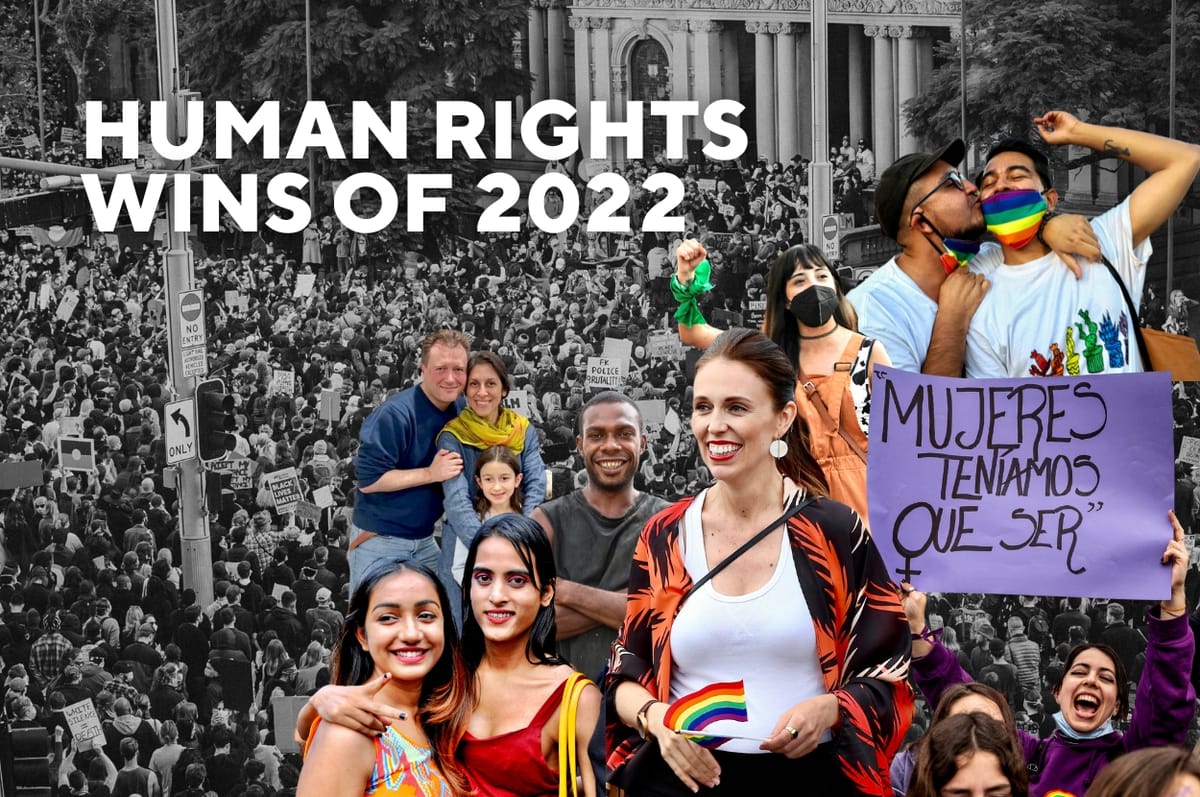23 Human Rights Wins To Celebrate In 2022
Here’s to a year of progress.

Despite what may seem like a lot of bad news, there were moments of hope and progress in 2022.
As we enter the new year, take a look back at some of the many human rights victories that were won around the world last year.
1. Colombia’s Top Court Voted To Decriminalize Abortion In The First 24 Weeks Of Pregnancy
In a historic victory for women’s rights, Colombia’s top court voted to decriminalize abortion in the first 24 weeks of pregnancy, making it the latest Latin America country to decriminalize the procedure.
Prior to the ruling, abortion in Colombia was only legal in certain circumstances: when the mother’s life is at risk, if the fetus has life-threatening abnormalities or when the pregnancy is a result of rape or incest.
If women seek abortions outside of these circumstances, they could face up to four and a half years in jail.
2. Mexico Will Now Allow Girls Who Have Been Raped To Get An Abortion Without Parental Consent
Mexico’s Supreme Court ruled that all girls can get an abortion without parental consent in cases of rape.
Prior to the ruling on May. 24, only women and girls older than 12 years old could obtain an abortion in cases of rape.
The Supreme Court judge said he hopes the ruling will protect girls who suffer from sexual abuse from family or authorities.
3. Finland Changed Its Law So Women No Longer Need To See Two Doctors To Get An Abortion
Finland’s parliament approved a reform to the country’s abortion law that would make it easier for people to get the procedure.
Under the reform, which passed by a large majority of 125-41 on Oct. 26, people can request an abortion up to 12 weeks of a pregnancy with the approval of one doctor, instead of two.
They will also no longer need to provide additional reasons for seeking the procedure such as their social and economic situation.
4. Israel Eased Its Abortion Laws So Women No Longer Have To Ask A Special Committee For Approval
Israel loosened its abortion laws to allow people to get abortion pills through the country’s universal health system and not have to appear in front of a special committee to get approval to terminate a pregnancy.
Under the new rules, to take effect over the next three months, women can undergo abortions at local health clinics instead of only at hospitals or surgical clinics.
They will also no longer need to physically appear before a committee, made up of a social worker and two doctors, to apply for an abortion.
5. Spain Passed A “Only Yes Means Yes” Law That Clearly Defines Rape As Sex Without Consent
Spain’s Congress finally passed a law known as the “only yes means yes” law, which states that lack of sexual consent is sufficient to prove sexual assault.
It comes after a series of court cases in which five men were jailed for sexual abuse, and not rape, after they gang-raped an 18-year-old woman at the running of the bulls festival in Pamplona in 2016.
6. New Zealand Officially Banned LGBT Conversion Therapy
New Zealand passed a law banning conversion therapy, a widely discredited practice that seeks to change or suppress a person’s sexual orientation, gender identity or gender expression.
The bill was passed nearly unanimously by New Zealand lawmakers on Feb. 15 and took effect immediately.
The new law makes it illegal for people to practice conversion therapy on anyone aged under 18 or on someone who lacks proper decision-making capacity, with sentences of up to three years.
Conversion therapy that causes “serious harm” to anyone, regardless of age, is also considered an offense and punishable with up to five years in prison.
7. Canada Officially Banned LGBT Conversion Therapy
Canada banned conversion therapy, making it illegal to provide, promote or profit off conversion therapy.
The new law, which went into effect on Jan. 7, defines conversion therapy as “any practice, treatment or service designed to change or repress a person’s sexual orientation, gender identity or gender expression,” according to NPR.
8. The Philippines Finally Raised The Age Of Sexual Consent From 12 To 16
The Philippines officially raised the age of sexual consent from 12 to 16 on March 6.
The new law, which is gender neutral, states that any adult who engages in sexual contact with anyone under the age of 16 is committing statutory rape.
Previously, the Philippines had one of the world’s lowest minimum ages of sexual consent, behind Nigeria’s age of 11, according to UNICEF.
9. Singapore Overturned A Ban On Gay Sex
Singapore’s government struck down a colonial era law that made gay sex illegal, the prime minister said on Aug. 21.
Section 377A of the penal code was introduced in 1938 under British colonial rule and had criminalized sex between two consenting male adults.
10. Consensual Same-Sex Sexual Activities Are No Longer Illegal In Antigua And Barbuda
Antigua and Barbuda’s high court ruled that criminalizing consensual same-sex acts is unconstitutional, determining that the law cracked down on people’s individual rights such as freedom of expression and privacy.
In Antigua and Barbuda, a British colonial-era law that banned “buggery” and “indecency” influenced the Sexual Offense 1995 Act banning same-sex acts, according to the BBC.
11. Gay Sex Is No Longer Illegal In Barbados
Barbados’ top court struck down colonial-era laws banning gay sex.
The high court issued an oral ruling on Dec. 12, finding the laws unconstitutional after two LGBTQ activists put forward a case.
12. Zambia Has Abolished The Death Penalty, Becoming The 25th Country To Do So
Zambia’s president Hakainde Hichilema announced that the country has abolished the death penalty for all crimes on Dec. 23, becoming the 25th African country to end capital punishment.
The death penalty will now be replaced by life imprisonment.
13. Papua New Guinea Abolished The Death Penalty After Reintroducing It 30 Years Ago
Papua New Guinea has abolished the death penalty after it was reintroduced 30 years ago.
Prime Minister James Marape said capital punishment was “not an effective deterrent to serious crime,” according to the Guardian.
14. Malaysia Is Abolishing The Death Penalty As Mandatory Punishment For Certain Crimes
Malaysia will abolish the death penalty as a mandatory form of punishment for certain crimes and replace it with other types of punishment at the court’s discretion, the government said on June. 10.
The death penalty is currently mandatory for 11 crimes in Malaysia, including murder, drug trafficking, terrorism, kidnapping and possessing firearms, according to Channel News Asia.
15. Cubans Overwhelmingly Voted To Legalize Same-Sex Marriage In A Historic Referendum
More than two-thirds of Cubans voted to legalize same-sex marriage and allow same-sex couples to adopt children after a national referendum on Sunday Sep. 25.
Around 74% of the population voted in the referendum and more than 3 million people, 66.87% of the valid votes, approved the new Family Code.
The 100-page referendum aimed to reform the Family Code and will provide more rights to the LGBTQ community, women, children and the elderly.
16. Same-Sex Marriage Is Now Legal In All Of Mexico’s States
The northeastern Mexican state of Tamaulipas voted to legalize same-sex marriage, making same-sex marriage legal across all of Mexico’s 32 states.
The first state to legalize same-sex marriage was Mexico city in 2009, and only two other states, Quintana Roo and Coahuila, followed.
17. In A Landmark Moment, Slovenia Legalized Same-Sex Marriage And Adoption
In a landmark moment, Slovenia’s parliament voted to pass an amendment that will allow same-sex couples to marry and adopt children.
Slovenia’s government has recognized same-sex partnerships since 2017, providing some of the rights heterosexual couples enjoyed, but not joint adoption and in vitro fertilization.
18. India’s Top Court Ruled That Marital Rape Is Rape And Abortion Is Legal For Everyone Up To 24 Weeks
In a landmark ruling, India’s Supreme Court has ruled that marital rape is rape and that everyone has the right to get an abortion up to 24 weeks in a pregnancy, regardless of their marital status.
In India, single women were unable to get an abortion due to a 1971 law that had limited abortions to only married women, divorcees, widows, minors, “disabled and mentally ill women” and survivors of sexual assault or rape, according to Reuters.
19. India’s Top Court Ruled That Sex Work Is A Profession, Giving Sex Workers Protections Under The Law
India’s Supreme Court ruled sex workers, like people in any other profession, deserve equal protection and to live with dignity under the law.
The May 19 ruling noted “the attitude of the police to sex workers is often brutal and violent. It is as if they are a class whose rights are not recognized.”
It states law enforcement authorities should not abuse sexual workers and coerce them into any sexual activity.
20. India Widened Its Definition Of “Family” To Include Single Parents, Same-Sex Couples And Stepfamilies
India’s Supreme Court expanded its definition of what a family constitutes, ruling that same-sex couples and other “unconventional” households should also receive family benefits.
The decision comes following a nurse, Deepika Singh, brought forward a case after she was denied maternal leave by her employer because she had already applied for the same benefit in a previous marriage.
21. This British-Iranian Charity Worker Jailed By Iran As A Political Hostage For Six Years Has Been Freed
Nazanin Zaghari-Ratcliffe, a British-Iranian charity worker who was imprisoned for six years in Iran, was released and returned home to the UK.
Zaghari-Ratcliffe had been visiting family in Iran with her 22-month-old daughter in 2016 and was about to board a plane back to the UK when she was detained by authorities at Tehran airport.
Her husband, Richard Ratcliffe, campaigned tirelessly for her release, making headlines in October 2021 for enduring a three-week hunger strike to call for the UK government to repay a £400 million debt to the Iranian government dating back to 1970, which he believed was a precondition to releasing his wife.
22. This Popular Myanmar Celebrity Model Jailed For Three Years For Protesting The Coup Has Been Freed
Paing Takhon, one of Myanmar’s most popular celebrities, who was sentenced to three years in prison for taking part in mass protests against the military coup, was pardoned and released.
Takhon was among six actors and directors released from jail on March 2 “in order for them to participate in nation-building with their art,” according to a military statement, which gave no further details.
23. Scotland Passed A New Law Allowing People Over 16 To Self-Identify Their Legal Gender
Scotland’s parliament passed a law that will make it easier for people to legally change their gender.
The new law will allow people to self-determine their legal gender without needing to get medical or judicial approval.
People aged 16 and up will now be able to change their gender on official documents through a declaration.




